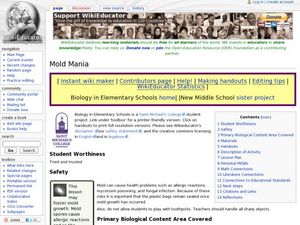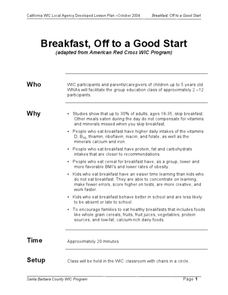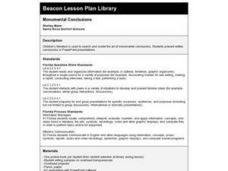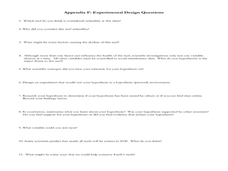Curated OER
Investigation-How Far Can You Jump?
Students explore measurement. In this math lesson plan, students measure how far they can jump using blocks. Students compare the results when different sized blocks are used. Students estimate the distance jumped.
Curated OER
Plane and Solid Figures
Pupils define a plane and a solid shape. In this geometry lesson, students compare and contrast different geometric shapes as they relate to solids. They name the geometric solids based on their sides and edges.
Curated OER
Big Beans, Little Beans
Students measure and note the variation in the lengths of lima beans. They compare the growth rate of different sized beans.
Curated OER
Finding the Area of Triangles
Twelfth graders apply the formula for finding the area of a triangle to various problems. They work real life problems for finding the area of a bathroom and the cost of tiling it. They play a game, Triangle Bingo, where they match...
Curated OER
Discovering Decimals
Pupils explore decimals. They use personal computers to compare decimal numbers and examine place value. Students participate in an animation game to complete decimal problems.
Curated OER
Is It Possible?
Students brainstorm ideas on how to a group of people could reach the highest together. In this possibilities lesson plan, students test their ideas and see how high they can reach.
Curated OER
Primary Biological Content Area Covered
Students use the scientific method to make predictions about mold growth. In this fungus lesson, students use worksheets to help them illustrate predictions and graph mold growth from white to wheat bread. Students first...
Curated OER
Math, Chemistry, and Food
Students explore the effects of chemical reactions when cooking. Using the Internet, they research enzymes and then mix jello. They examine their results and test enzyme activity by adding pineapple to the jello. Finally, they test...
Curated OER
Macbeth
Students examine patterns of imagery in Macbeth by using online resources. Students compare the patterns they see to those they've found in other Shakespeare plays. Then students draw conclusions about why Shakespeare might have used the...
Curated OER
Breakfast, Off to a Good Start
Students discover the benefits of eating a healthy breakfast. In this adult health lesson, students compare the characteristics of breakfast eaters and nonbreakfast eaters. They examine cereals for their fiber and sugar content.
Curated OER
How Much of Each Nutrient Does Your Body Need, and How Can You Find Out What Is In Each Food?
Fifth graders practice reading food labels to find nutrients in foods. In this health lesson, 5th graders read food labels and discuss the recommended daily allowance of each nutrient. They compare this to the food pyramid and create a...
Curated OER
Breakfast Boosts Brainpower
Young scholars examine the importance of eating a balanced breakfast. In this healthy eating lesson students identify examples of a healthy breakfast and compare the characteristics of people who do or do not eat breakfast.
Virginia Department of Education
Similar Triangles
Pupils work in pairs to investigate what it takes to prove that two triangles are similar. They work through various shortcuts to find which are enough to show a similarity relationship between the triangles. Small groups work with the...
Virginia Department of Education
Finding the Formula and Percent Composition
Do you have mole problems? If so, call Avogadro at 602-2140. The instructional activity starts with pupils working independently to solve for molar mass of ionic compounds. Then they learn to solve for percent composition and later...
Virginia Department of Education
Constructions
Pupils learn the steps for basic constructions using a straightedge, a compass, and a pencil. Pairs develop the skills to copy a segment and an angle, bisect a segment and an angle, and construct parallel and perpendicular lines.
Curated OER
Rockets on a Shoestring Budgut
Students work together to create rockets on a budget. They discover the limitations that real engineers face when designing and testing their products. They discuss their findings to complete the lesson plan.
Curated OER
Erosion And the Cycling of Rocks And Minerals
Learners investigate the concept of erosion by water in a problem solving activity. In small groups, they are assigned either sand, potting soil or rocks to construct a mountain that will hold up to a sprinkler can of water dripping on...
Curated OER
Caesar
Young scholars examine patterns of imagery in Caesar by using online resources. Students compare the patterns they see to those they've found in other Shakespeare plays. Then young scholars draw conclusions about why Shakespeare might...
Curated OER
Cool to Rule: A Game of Prediction and Measurement
Pupils demonstrate measurement and estimation skills. In small groups, they are given a measurement, predict what object in the classroom is equal to that specific measurement, and record their data in a table that includes the...
Curated OER
Video Umpires
Students play umpire in a baseball game. They video the umpire's calls and then examine the accuracy of a "line call" when compared to a taped record of a ball's exact impact location. They create a transcript of a fictional court case...
Curated OER
Monumental Conclusions
Fourth graders create a PowerPoint presentation comparing a "Grabless Conclusion" to a "Monumental Conclusion", using picture books.
Curated OER
Mystery of the Senses-Touch
Students test the skin's range of sensitivity. Students complete a "Touch Areas" activity. They discuss their results with the class. Students make conclusions about which parts of the body are most sensitive to touch.
Curated OER
Marine Biology Lesson on Understanding the Dynamics of the Reef Ecosystem
Students compare data from a healty and unhealthy reef ecosystem. In this marine biology lesson, students identify which sample is stressed. They formulate a hypothesis on why the reef is stressed and support their hypothesis with proven...
Curated OER
Identifying the Relationship Between Black Carbon and the Weather
Students identify the relationship between black carbon and the weather. In this investigative lesson students compare samples of black carbon with a color-scale and analyze others samples.























